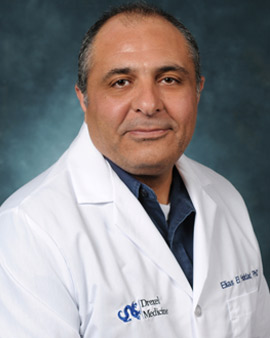College of Medicine Receives NIH Grant for $3.8 Million
August 18, 2017
 Elias Haddad, PhD, professor in the Department of Medicine’s Division of Infectious Diseases & HIV Medicine
Elias Haddad, PhD, professor in the Department of Medicine’s Division of Infectious Diseases & HIV Medicine
The National Institutes of Health (NIH) recently awarded a U19 grant to Drexel University for $3.8 million. The grant will support the investigation of hepatitis B vaccine response in co-infection with parasites. This research is led by Principle Investigator Elias Haddad, PhD, professor in the Department of Medicine's Division of Infectious Diseases & HIV Medicine.
Haddad's program, entitled "Integrative Omics of HepB Vaccine Response in Co-Infection with Parasites," will test the hypothesis that alterations in host innate and adaptive immune cells that are triggered by parasitic infections lead to an impaired immune response to vaccines, specifically hepatitis B vaccine. The research requires a comprehensive exploration of the mechanisms triggered by parasitic infections on vaccine-induced immunity, which may point to potential interventions that enhance immunological response to vaccines in the developing world. The objective is to develop immune models that characterize host response to hepatitis B vaccination at varying degrees of infection.
The U19 grant is a cooperative agreement program that leverages resources from several groups to achieve a specific research objective. Other universities that are part of this consortium include Case Western University, St. Jude Hospital, Washington University, and Uganda Virus Research Institute.
According to Haddad, "The U19 is special since it is part of a bigger consortium called the Human Immunology Program Consortium (HIPC). There's been only a few grants given in the past five or six years as part of this HIPC, and we are lucky that Drexel is leading one program."
Haddad is an immunologist and cell biologist by training. His research sits at the interface of four disciplines: human immunology, systems biology, infectious disease pathogenesis and vaccinology. His research also emphasizes examining immune responses in special populations, such the elderly, and is aimed at developing efficacious vaccines to improve immune responses and reduce the burdens of many infectious diseases in this population.